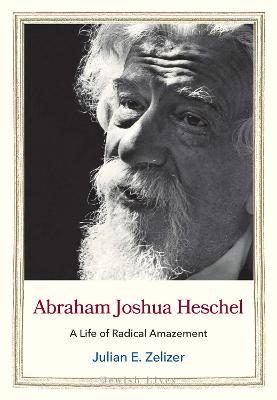Jewish Lives
1 total work
New in the acclaimed Jewish Lives series: A biography of the rabbi Abraham Joshua Heschel, who became a symbol of the marriage between religion and social justice
"Zelizer's book is absolutely riveting, both as a study of a truly important figure within Jewish thought and in providing insight into the politics of the 1960s."-Sandy Levinson, Balkinization
"When I marched in Selma, I felt my legs were praying." So said Polish-born American rabbi Abraham Joshua Heschel (1907-1972) of his involvement in the 1965 Selma civil rights march alongside Martin Luther King Jr. Heschel, who spoke with a fiery moralistic fervor, dedicated his career to the struggle to improve the human condition through faith. In this new biography, author Julian Zelizer tracks Heschel's early years and foundational influences-his childhood in Warsaw and early education in Hasidism, his studies in late 1920s and early 1930s Berlin, and the fortuitous opportunity, which brought him to the United States and saved him from the Holocaust, to teach at Hebrew Union College and the Jewish Theological Seminary. This deep and complex portrait places Heschel at the crucial intersection between religion and progressive politics in mid-twentieth-century America. To this day Heschel remains a symbol of the fight to make progressive Jewish values relevant in the secular world.
"Zelizer's book is absolutely riveting, both as a study of a truly important figure within Jewish thought and in providing insight into the politics of the 1960s."-Sandy Levinson, Balkinization
"When I marched in Selma, I felt my legs were praying." So said Polish-born American rabbi Abraham Joshua Heschel (1907-1972) of his involvement in the 1965 Selma civil rights march alongside Martin Luther King Jr. Heschel, who spoke with a fiery moralistic fervor, dedicated his career to the struggle to improve the human condition through faith. In this new biography, author Julian Zelizer tracks Heschel's early years and foundational influences-his childhood in Warsaw and early education in Hasidism, his studies in late 1920s and early 1930s Berlin, and the fortuitous opportunity, which brought him to the United States and saved him from the Holocaust, to teach at Hebrew Union College and the Jewish Theological Seminary. This deep and complex portrait places Heschel at the crucial intersection between religion and progressive politics in mid-twentieth-century America. To this day Heschel remains a symbol of the fight to make progressive Jewish values relevant in the secular world.
